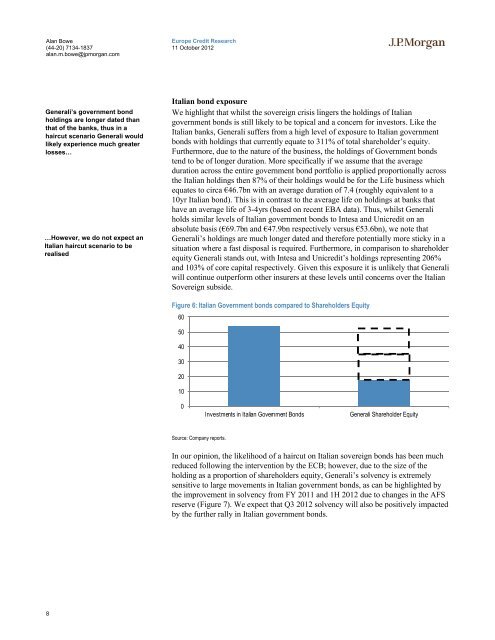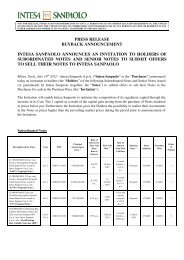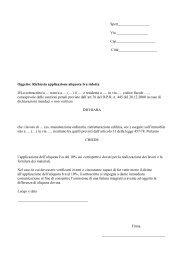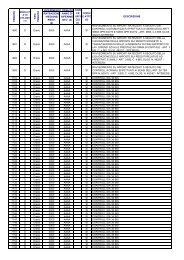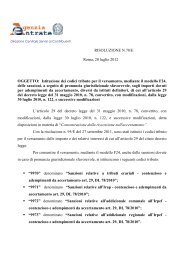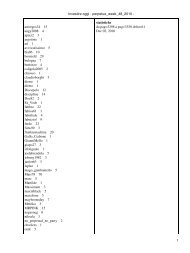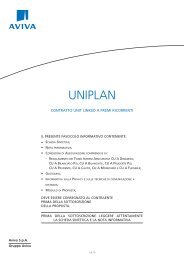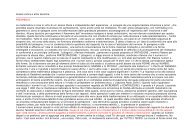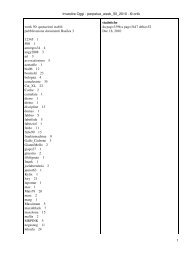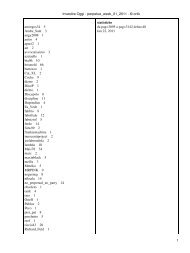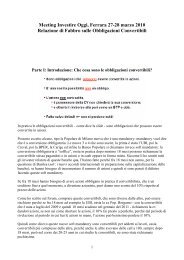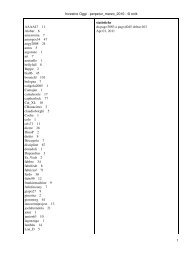Generali - InvestireOggi
Generali - InvestireOggi
Generali - InvestireOggi
Create successful ePaper yourself
Turn your PDF publications into a flip-book with our unique Google optimized e-Paper software.
Alan Bowe<br />
(44-20) 7134-1837<br />
alan.m.bowe@jpmorgan.com<br />
<strong>Generali</strong>’s government bond<br />
holdings are longer dated than<br />
that of the banks, thus in a<br />
haircut scenario <strong>Generali</strong> would<br />
likely experience much greater<br />
losses…<br />
…However, we do not expect an<br />
Italian haircut scenario to be<br />
realised<br />
8<br />
Europe Credit Research<br />
11 October 2012<br />
Italian bond exposure<br />
We highlight that whilst the sovereign crisis lingers the holdings of Italian<br />
government bonds is still likely to be topical and a concern for investors. Like the<br />
Italian banks, <strong>Generali</strong> suffers from a high level of exposure to Italian government<br />
bonds with holdings that currently equate to 311% of total shareholder’s equity.<br />
Furthermore, due to the nature of the business, the holdings of Government bonds<br />
tend to be of longer duration. More specifically if we assume that the average<br />
duration across the entire government bond portfolio is applied proportionally across<br />
the Italian holdings then 87% of their holdings would be for the Life business which<br />
equates to circa €46.7bn with an average duration of 7.4 (roughly equivalent to a<br />
10yr Italian bond). This is in contrast to the average life on holdings at banks that<br />
have an average life of 3-4yrs (based on recent EBA data). Thus, whilst <strong>Generali</strong><br />
holds similar levels of Italian government bonds to Intesa and Unicredit on an<br />
absolute basis (€69.7bn and €47.9bn respectively versus €53.6bn), we note that<br />
<strong>Generali</strong>’s holdings are much longer dated and therefore potentially more sticky in a<br />
situation where a fast disposal is required. Furthermore, in comparison to shareholder<br />
equity <strong>Generali</strong> stands out, with Intesa and Unicredit’s holdings representing 206%<br />
and 103% of core capital respectively. Given this exposure it is unlikely that <strong>Generali</strong><br />
will continue outperform other insurers at these levels until concerns over the Italian<br />
Sovereign subside.<br />
Figure 6: Italian Government bonds compared to Shareholders Equity<br />
60<br />
50<br />
40<br />
30<br />
20<br />
10<br />
0<br />
Source: Company reports.<br />
Investments in Italian Government Bonds <strong>Generali</strong> Shareholder Equity<br />
In our opinion, the likelihood of a haircut on Italian sovereign bonds has been much<br />
reduced following the intervention by the ECB; however, due to the size of the<br />
holding as a proportion of shareholders equity, <strong>Generali</strong>’s solvency is extremely<br />
sensitive to large movements in Italian government bonds, as can be highlighted by<br />
the improvement in solvency from FY 2011 and 1H 2012 due to changes in the AFS<br />
reserve (Figure 7). We expect that Q3 2012 solvency will also be positively impacted<br />
by the further rally in Italian government bonds.


